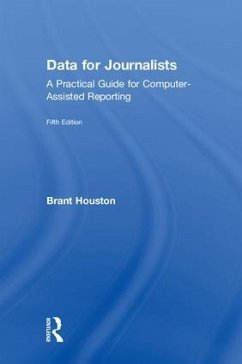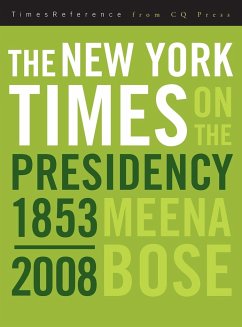
Public Affairs Reporting Now
News of, by and for the People
Versandkostenfrei!
Versandfertig in 6-10 Tagen
23,99 €
inkl. MwSt.
Weitere Ausgaben:

PAYBACK Punkte
12 °P sammeln!
Everyday life, no whether the issues or events arise next-door or a continent away, raises questions and concerns that the public counts on journalists to answer and, more important, confront.More than ever before, we all rely on the news media for warnings, explanations and insights. The profession - and society - cannot afford lazy, inept, uncommitted journalists. Today's reporters must learn how to cover public affairs intelligently and thoroughly. First you must learn about the institutions and people who influence the news; understanding how a legislative conference committee functions or...
Everyday life, no whether the issues or events arise next-door or a continent away, raises questions and concerns that the public counts on journalists to answer and, more important, confront.
More than ever before, we all rely on the news media for warnings, explanations and insights. The profession - and society - cannot afford lazy, inept, uncommitted journalists. Today's reporters must learn how to cover public affairs intelligently and thoroughly. First you must learn about the institutions and people who influence the news; understanding how a legislative conference committee functions or how a trial is conducted remain important pre-requisites. But it is not enough merely to know how to report. Journalists must also understand how they see, define and influence the news.
Don't be fooled by the daily dose of fluffy stories about fads, fashions or fetishes. People love to revel in celebrity gossip or fantasize about extreme makeovers. But Donald Trump's love life or the South Beach Diet don't satisfy when people worry about a home invasion in their neighborhood or a rezoning proposal to bring a Wal-Mart super center to town or a Department of Education report that their child's school scored bottom-most in reading achievement.
Public Affairs Reporting Now is intended to teach you the best practices and give you the best advice for covering what's generically known as "public affairs reporting. It's a term that's neither inspiring nor precise, but it's long been a convenient way of describing the kind of news coverage that keeps people informed as citizens and keeps our institutions, public and private, focused on the public good.
More than ever before, we all rely on the news media for warnings, explanations and insights. The profession - and society - cannot afford lazy, inept, uncommitted journalists. Today's reporters must learn how to cover public affairs intelligently and thoroughly. First you must learn about the institutions and people who influence the news; understanding how a legislative conference committee functions or how a trial is conducted remain important pre-requisites. But it is not enough merely to know how to report. Journalists must also understand how they see, define and influence the news.
Don't be fooled by the daily dose of fluffy stories about fads, fashions or fetishes. People love to revel in celebrity gossip or fantasize about extreme makeovers. But Donald Trump's love life or the South Beach Diet don't satisfy when people worry about a home invasion in their neighborhood or a rezoning proposal to bring a Wal-Mart super center to town or a Department of Education report that their child's school scored bottom-most in reading achievement.
Public Affairs Reporting Now is intended to teach you the best practices and give you the best advice for covering what's generically known as "public affairs reporting. It's a term that's neither inspiring nor precise, but it's long been a convenient way of describing the kind of news coverage that keeps people informed as citizens and keeps our institutions, public and private, focused on the public good.














